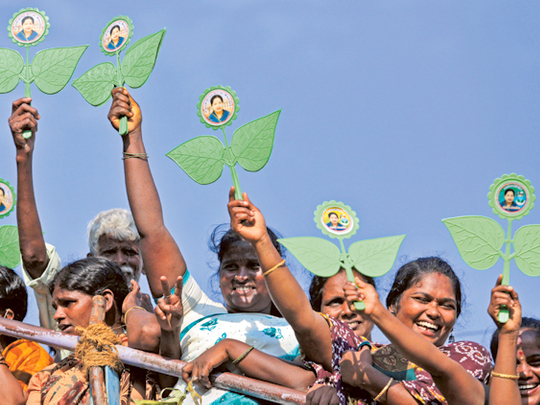
Thiruvananthapuram: As India’s Parliamentary elections enter the fourth week, there’s a supreme irony for the perceived front-runner — the Bharatiya Janata Party. It hardly has any presence in Tamil Nadu, yet that state may decide whether the BJP is able to get past the winning 272-seat mark.
For decades, voters in Tamil Nadu have hardly looked beyond the All India Anna Dravida Munnetra Kazhagam (AIADMK) and the Dravida Munnetra Kazhagam, with the Congress playing a side role at best.
The BJP has not been on the political radar here and yet its likelihood of forming a government in Delhi in 2014 may well hinge on securing a partner from Tamil Nadu, most likely the AIADMK.
Hopes of a post-election BJP-AIADMK tie-up appeared dented last week when AIADMK supremo and state chief minister Jayalalithaa Jayaram and BJP strongman Narendra Modi exchanged verbal volleys.
“They (the AIADMK and the DMK) have been ruling the state for decades, leaving the people with little choice”, remarked Modi during his recent rally in Chennai, going on to say that those “old tricks” would not work any longer.
Jayalalithaa wasted little time to hit back, pointing out that the “BJP stands no chance to win a single seat in Tamil Nadu”. Her ire was particularly directed at the previous BJP governments in neighbouring Karnataka, which she said sacrificed the interests of Tamil Nadu on the Cauvery water sharing issue.
Political observers believe that Jayalalithaa and Modi have good reasons to disagree with each other. While the BJP may already be dreaming of heading the government in Delhi, Jayalalitha has every reason to believe that it cannot secure the requisite numbers without the AIADMK’s support.
In fact, many believe Jayalalitha even hopes to be the PM, should the numbers fail to throw up a clear winner and some coalition partners are not too comfortable with Modi as PM.
At another level, Gujarat and Tamil Nadu are also competing for top honours on development and social indicators.
Jayalalithaa has questioned the Gujarat Model of development theory, saying recently that in fact it was her government that had delivered public services to the people, while Gujarat had merely done a lot of PR and image marketing.
The reality on the ground for individual parties in Tamil Nadu is quite different from the AIADMK-BJP spat at the state-level.
In 2009, DMK won the Lok Sabha election convincingly. Of the 39 seats in Tamil Nadu and the lone seat of the union territory of Pondicherry, Muthuvel Karunanidhi’s DMK and the Congress party had together picked up 28 seats including Pondicherry.
Things have changed dramatically since then. The DMK-Congress alliance has broken up and this year each party is contesting on its own.
With the Congress going it alone for the first time in 16 years, only the BJP has any alliance to speak of, with a combination that includes Vijayakant’s DMDK, S. Ramadoss’ PMK and Vaiko’s MDMK.
Another major development has been the implosion in the DMK. Forced to make a choice between his warring sons Stalin and Azhagiri, DMK chief M. Karunandihi settled for the former. That has left the DMK to fight an internal battle in addition to the bigger one against the AIADMK.
The DMK now faces the wrath of Azhagiri and his supporters in constituencies south of Madurai, where Azhagiri is adored by DMK cadres as ‘Anja Nenjan’ or braveheart.
The AIADMK has its own set of troubles,. In the 2011 assembly polls that the party swept, power cuts were an election issue that the AIADMK used to telling effect to topple the DMK government. Now, power cuts in different parts of the state are boomeranging on the AIADMK. The party also has to face up to the new entrant, the Aam Aadmi Party.
The Congress is seen to be fighting a losing battle this time, weakened further by the absence of allies.
All of that makes Tamil Nadu a key electoral battle for the BJP and the AIADMK for their national prospects. A few seats here or there can make the difference between ruling in Delhi or sitting in Opposition. Temperatures in many places in Tamil Nadu are hovering around the sizzling 40 degrees. That isn’t stopping all parties from making every attempt to capture the biggest possible share of the state’s 40 seats.












